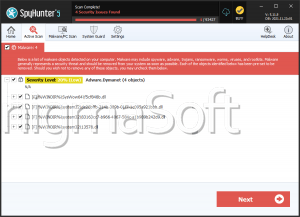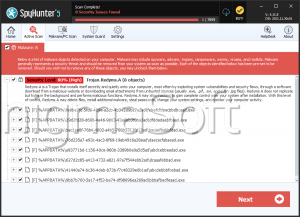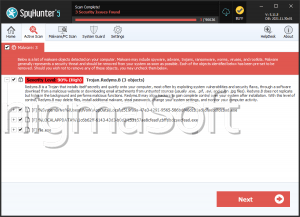Dym Ads
Threat Scorecard
EnigmaSoft Threat Scorecard
EnigmaSoft Threat Scorecards are assessment reports for different malware threats which have been collected and analyzed by our research team. EnigmaSoft Threat Scorecards evaluate and rank threats using several metrics including real-world and potential risk factors, trends, frequency, prevalence, and persistence. EnigmaSoft Threat Scorecards are updated regularly based on our research data and metrics and are useful for a wide range of computer users, from end users seeking solutions to remove malware from their systems to security experts analyzing threats.
EnigmaSoft Threat Scorecards display a variety of useful information, including:
Ranking: The ranking of a particular threat in EnigmaSoft’s Threat Database.
Severity Level: The determined severity level of an object, represented numerically, based on our risk modeling process and research, as explained in our Threat Assessment Criteria.
Infected Computers: The number of confirmed and suspected cases of a particular threat detected on infected computers as reported by SpyHunter.
See also Threat Assessment Criteria.
| Threat Level: | 80 % (High) |
| Infected Computers: | 410 |
| First Seen: | June 15, 2015 |
| Last Seen: | May 2, 2023 |
| OS(es) Affected: | Windows |
Numerous computer users have reported problems involving Dym. These intrusive advertisements may interrupt computer users attempting to use an affected Web browser. Dym advertisements may be caused by a PUP (Potentially Unwanted Program installed on the affected computer. Dym advertisements are characterized by the fact that they may appear repeatedly and be associated with other problems on the affected computer, such as Web browser redirects and performance issues. To stop Dym advertisements from appearing, computer users should remove the PUP causing the presence of these advertisements immediately with the help of a reliable, fully updated security application.
Table of Contents
PUPs Associated with Dym Advertisements and Similar Advertising Material
Advertisements like the ones displayed by Dym are not limited to regular advertising, ubiquitous on the Internet. Rather, they may advertise known hoaxes. Dym may try to convince computer users to call fake technical support numbers that may compromise their banking information and credit card data. Dym may try to convince computer users that their computers are missing an update; the supposed updates may be PUPs and even more threatening components. PUPs linked to Dym should be removed to stop these kinds of advertisements from appearing. This is because Dym may lead to additional issues and other infections on the computer.
Dym Advertisements also may be Used to Generate Revenue at the Expense of Inexperienced Computer Users
Dym advertisements and similar advertising messages may be used to generate enormous revenues at the expense of affected computer users. These types of advertisements may use affiliate marketing and pay-per-click schemes to make money. Components linked to Dym may insert affiliate code into links clicked on affected Web browsers. They also may direct computer users to websites containing advertisements and affiliate marketing content. PUPs associated with Dym may cause other symptoms in order to force computer users to view sponsored content. Some common symptoms linked to Dym may include the following:
- PUPs associated with Dym may display pop-up messages and windows on affected Web browsers and multiple types of advertisements apart from the Dym advertisements themselves.
- PUPs linked to Dym may cause Web browser redirects that lead computer users to sponsored content.
- These types of PUPs may make changes to affected Web browsers such as changing the affected Web browser's home page and default search engine to content associated with Dym.
- PUPs linked to Dym may cause performance issues on affected computers, making the affected Web browser run slowly, crash and take longer than normal to load a Web page.
How PUPs Associated with Dym may Enter a Computer
PUPs associated with Dym may be distributed by bundling them with a free program. Installers that bundle PUPs with free software may be present on public software download websites. These types of PUPs may be more common with download managers and other low-quality freeware programs. However, it is very common for legitimate programs to be bundled with PUPs by a third party that may be using custom installers to deliver these types of unwanted components. These types of installers may make it very difficult for inexperienced computer users to opt out of installing PUPs and content linked to Dym. Some ways in which these installers may make it difficult for computer users to opt out include opting the computer user in automatically, using convoluted language to mask Dym's real purpose, and hide the opt out option behind custom or advanced installation options.





Submit Comment
Please DO NOT use this comment system for support or billing questions. For SpyHunter technical support requests, please contact our technical support team directly by opening a customer support ticket via your SpyHunter. For billing issues, please refer to our "Billing Questions or Problems?" page. For general inquiries (complaints, legal, press, marketing, copyright), visit our "Inquiries and Feedback" page.